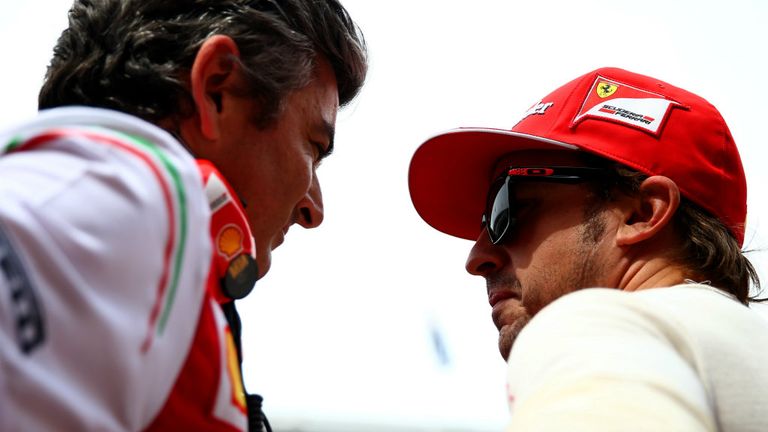Ferrari's Marco Mattiacci confident three-year masterplan will return title to Maranello
"Culturally I want to turn the page," new team boss tells Sky F1
Monday 1 September 2014 13:19, UK
Ferrari Team Principal Marco Mattiacci has set the target of returning the Italian marque to world title-winning ways within three years.
Mattiacci, installed as Ferrari’s new team boss in April after predecessor Stefano Domenicali resigned, has been charged with restructuring the F1 operation at Maranello in order to eventually overhaul the sport’s current standard-bearers Mercedes and Red Bull.
In an exclusive interview with Sky Sports F1, Mattiacci expressed confidence that his evolving plan – which has already resulted in changes to their underperforming engine department – will deliver the desired results in time.
“We are basically setting up a strategy that is going to be for the next three years and that is probably for sure going to see Ferrari go back to the top in Formula 1 and succeed,” Mattiacci, who headed up Ferrari’s North American roadcar division before being switched to F1, told Martin Brundle. “But eventually [we want] a way to organise the team operation-wise that is quite different from what it is today.”
“I think Ferrari is one of the most impressive, iconic franchises in the world - that is, so many opportunities that lie ahead of us that I think we are going to create impressive value. But first is to go back to winning the World Championship.”
Trending
- Papers: Rashford loses Man Utd dressing room after public comments
- 'Cultural overhaul needed' | Neville slams mediocre Man Utd
- Amorim: Anxiety around Old Trafford is affecting our mentality
- Liverpool latest: Wherever I end my career I am happy - Salah
- Impatient Ange vows to never change as Carra questions tactics again
- 'Performance of champions' | Carra praises Liverpool's statement win
- Goals galore! Liverpool trump Spurs in NINE-goal bonanza
- Bournemouth stun Man Utd in Christmas nightmare for Amorim
- Transfer Centre LIVE! Could Maguire leave Man Utd for free next summer?
- Anderson stunned by De Graaf in shock Ally Pally exit
Although Ferrari, the only team which has an F1 lineage which dates back to the first year of the World Championship in 1950, are the sport’s most successful team in history, Mattiacci warned it would still take the team in its current guise time to achieve the kind of success the company has in the past become accustomed to.
“You have seen how long it took for Mercedes to arrive here. You have seen how long it took Red Bull to achieve what it achieved,” he pointed out.
“I guess we are starting from quite a strong baseline – we have, as I said at the beginning, important assets, we have a tradition. Having said that, we need to improve some kind of strategy, some kind of bias to the way we work. [To remove] some kind of short-term approach to the racing activities, to the technical activities.
“So, as I said, it is going to take a while. This is not soccer: you don’t change the coach and buy two players and you are going to win next year’s championship.”
Ferrari’s failure to win either world title since their 2008 constructors’ success has increasingly cranked up the pressure on the team and the number of high-profile departures in the intervening years – including Chris Dyer, Aldo Costa, Domenicali and, most recently, engine chief Luca Marmorini – has prompted suggestions that the marque’s senior management have repeatedly been looking for ‘scapegoats’ for their lack of success.
Denying that has been the case, Mattiacci made it clear that “I don’t like blaming culture, I don’t like to point the finger to my colleagues” and said improved inter-departmental communication was key to a stronger Ferrari.
“Culturally I want to turn the page,” he said. “We need to have a different culture because we need to modernise the way we work, we need to make sure that we create a positive pressure that is going to make us make the kind of leap forward every race. A culture where people work together where communication is open to everybody, information is open to everybody.
“In all the organisations that I ran before it’s not that much important the hierarchy, but it’s important the ideas and it’s important that everybody knows what the other is doing because you can always give a better suggestion and you need to know what your colleague is doing in the other area. So communication is key.”
And while aware that returning Ferrari to former glories is a long-term project, Mattiacci admitted that the team are pinning much of their hopes on a stronger 2015 on the partial lifting of the engine freeze, which allows manufacturers to make some changes to their turbo power-unit designs this winter.
“It’s clear that it’s one of the areas where we are not at the top, so it’s one of the main areas of focus,” he added. “But it’s the entire package. It’s not aero, it’s not only the engine, it’s not the chassis, it’s all the package – including the people in the team.”






